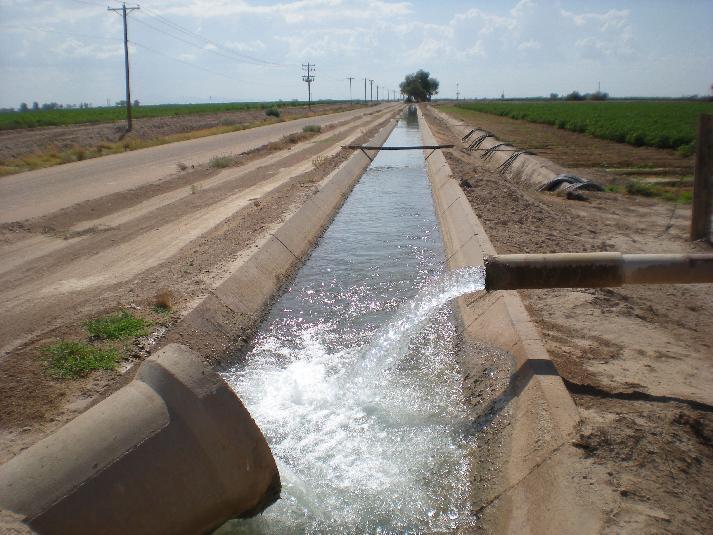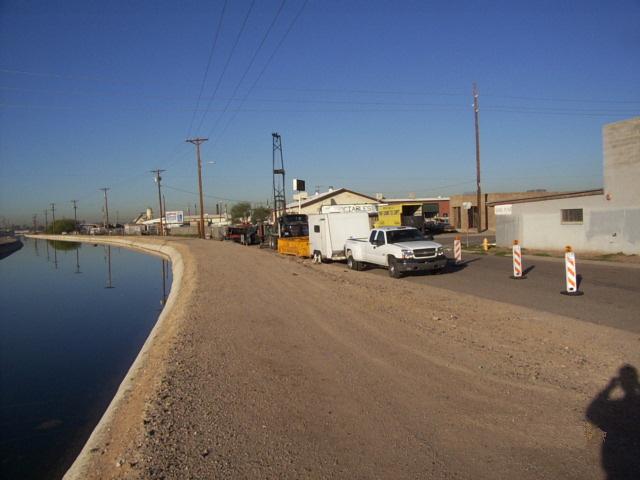The Arizona Department of Environmental Quality’s Water Quality Division

Irrigation canal and valve outside Phoenix, Arizona. (Credit: ADEQ)
With an average rainfall of only 12.5 inches per year and a population that’s growing faster than the country’s, Arizona is a state that faces unique challenges, especially when it comes to clean, safe water. The Water Quality Division of the Arizona Department of Environmental Quality (ADEQ) protects and enhances public health and the environment by monitoring and regulating drinking water. And although they make use of the latest scientific methods and new technology, given the current state of Arizona’s water system, they also rely upon low-tech equipment and cooperation from members of the community to monitor water quality in the state.
Team members in the Groundwater Protection Program work to sample, test and characterize groundwater quality in all 51 of Arizona’s basins. They conduct comprehensive sampling, including systematic grid-based random sampling, random sampling, stratified random sampling and, occasionally in the vicinity of targeted land uses, higher density sampling.
Sam Nuanez, Communications Lead for ADEQ, explained the process the Water Quality Division navigates every day in the process of ensuring groundwater is safe:
“Water quality at a public water system providing drinking water is monitored at many different points in the distribution system by the water system itself and the results are submitted to ADEQ. Since about half of Arizona’s drinking water comes from wells, the Groundwater Protection group analyzes samples collected in Arizona’s groundwater basins in a rotating basis. A listing of our most recent reports is available online. Since we rely on existing wells and people allowing us to collect water samples, our equipment is fairly simple: sample bottles, coolers and an off-road vehicle.”
In fact, 300,000 or more Arizonans rely on private wells for their drinking water, and these are not subject to public water system regulations such as those promulgated by the Environmental Protection Agency (EPA). The basin studies ADEQ conducts provide critical information about groundwater quality, including predictions about the basins and any changes that the team expects will take place over time, such as where specific problems with groundwater quality could occur. These studies are a unique source of information and an invaluable resource for users and owners of private wells hoping to meet water quality standards set by the Safe Drinking Water Act (SDWA).
The samples ADEQ team members collect are subjected to SDWA inorganic analysis, and tested for hydrogen and oxygen isotopes onsite. Other analyses, for radon, radiochemistry and Volatile Organic Compounds (VOCs) such as pesticides and perchlorate, are also undertaken as dictated by the location of the sampling. Team members also sample groundwater for regional studies, analyzing significant differences in parameter levels from place to place over time.

West Central Phoenix (WCP) North Canal Plume. (Credit: ADEQ)
Unique geography, unusual challenges
Arizona is an unusual place in terms of our water outlook, and ADEQ has taken a number of steps to understand Arizona’s water resource challenges and manage the demand for water and the geography of the area.
“ADEQ works closely with our partners at Arizona Department of Water Resources (ADWR) to work on the challenges Arizona faces,” Nuanez explains. “ADEQ’s Water Reuse program is dedicated to making sure water is consistently used for its highest and best use. For instance, with Arizona’s economy depending on tourism, many golf courses use recycled water to irrigate — allowing green fairways in an arid environment without impacting drinking water sources. Similarly, recycled water can be used safely to water crops allowing the agricultural industry to thrive.”
This is a critically important area for Arizona. Agricultural production is and always has been vital to the state, pumping more than twelve billion dollars into the state’s economy annually. Agriculture is also the largest water-consuming sector by a long sight, responsible for about 70 percent of Arizona’s water demand, statewide. With looming water shortages ahead, water recycling isn’t just a good idea; it’s a necessity.
Creative solutions in the desert
The ADEQ has not been shy about asking the rest of the state to collaborate in coming up with creative solutions for the state’s need for water. This approach has paid off, with several great projects in recent years, such as the Pure Brew Competition.
Nuanez described this recent project as a success for the ADEQ and the state of Arizona:
“One area that has seen attention within Water Reuse is the idea of taking water from a wastewater treatment plant and processing it to drinkable standards. Recently, ADEQ worked with the Pure Brew Innovation Challenge team to permit water produced by treatment plants in Tucson, Phoenix and Flagstaff to be used to make beer and bottled water. A competition was held to determine who could make the best microbrew beer from recycled water.”
The challenge spread awareness about the effective treatments available for water and the new ways we now have to reuse water in the community. It also produced three winners, who all brewed high-end craft beer from recycled, purified water: the winner, Dragoon Brewing Company, with its Clear Water Pilsner; the runner up, Arizona Wilderness Brewing Company, with its Pure Water Double IPA; and the People’s Choice award winner, Crooked Tooth Brewing Company, with its unique Tamarind Sour Brown.
The water team at ADEQ gets a high level of satisfaction from taking its work to the community, and from serving that community. Nuanez comments, “At ADEQ, scientists and engineers, are continually challenging themselves to improve their processes so that they can better protect people and the environment. Every day, they ask themselves, ‘what can we do to solve Arizona’s problems,’ and it’s great to have that as our mission.”
Top image: Irrigation canal and valve outside Phoenix, Arizona. (Credit: ADEQ)





0 comments